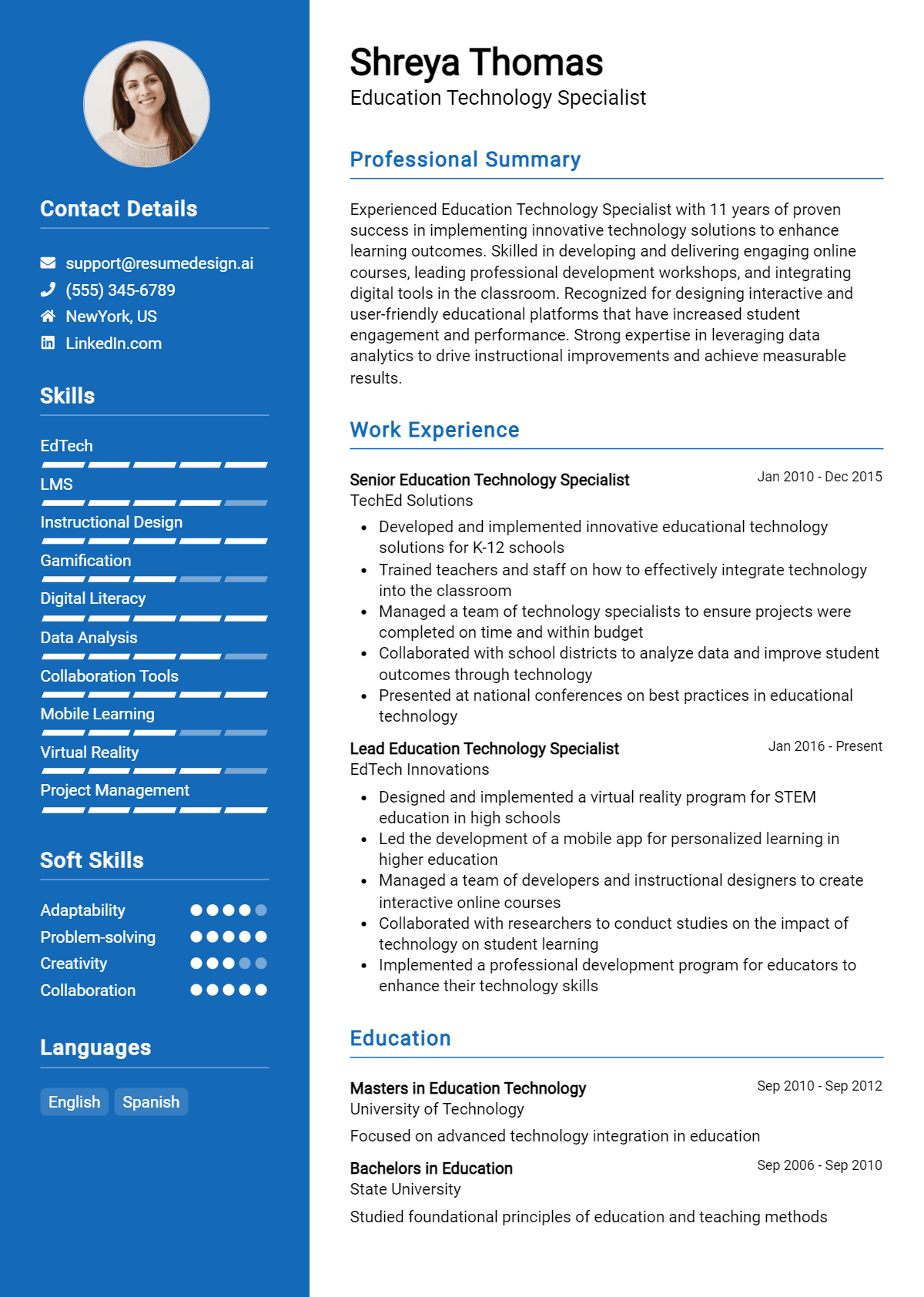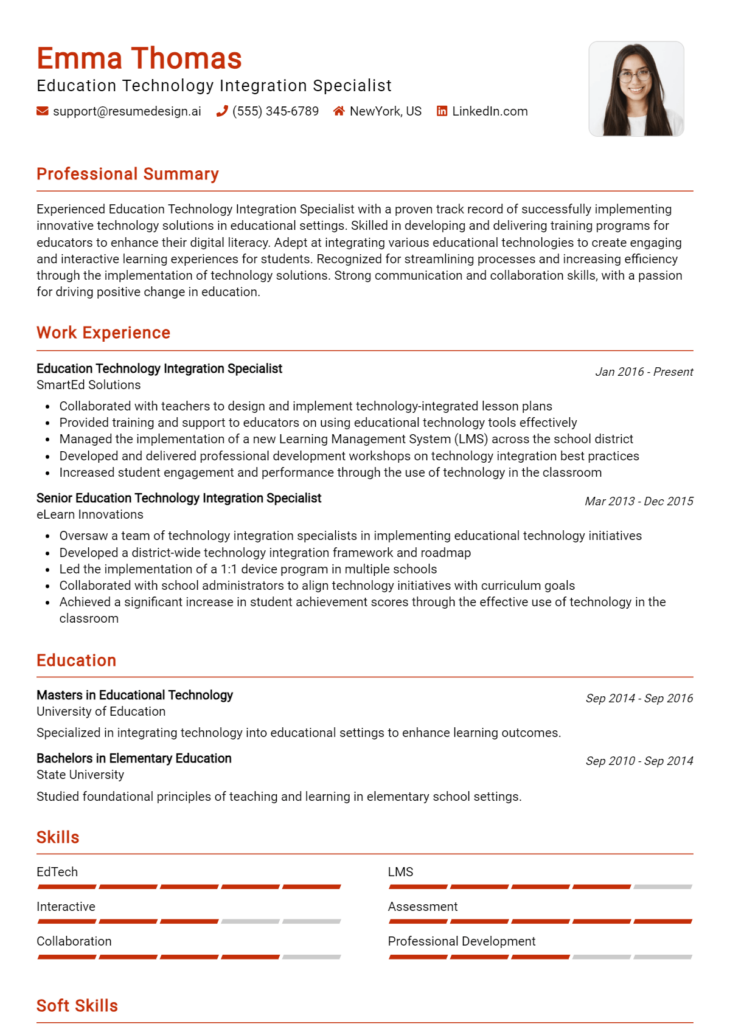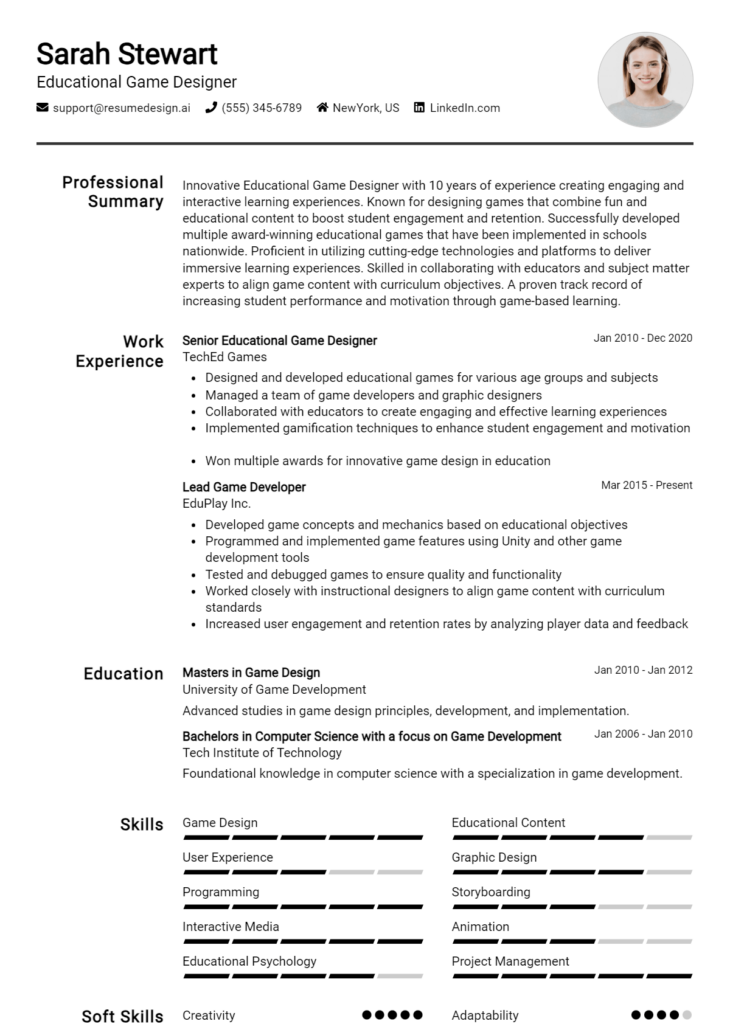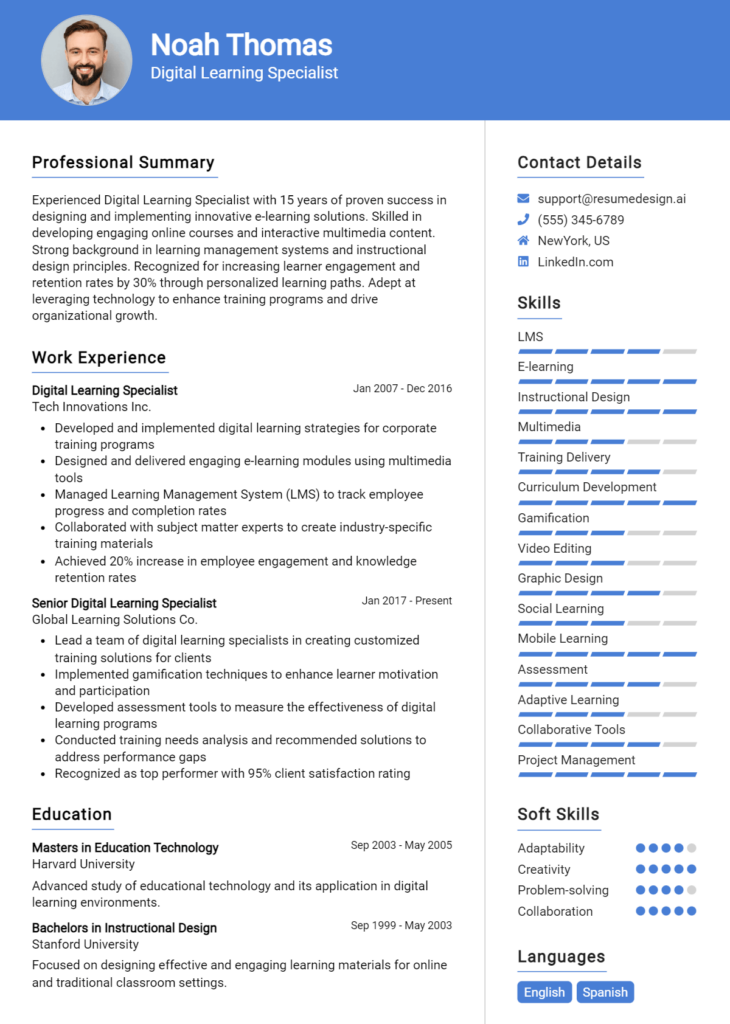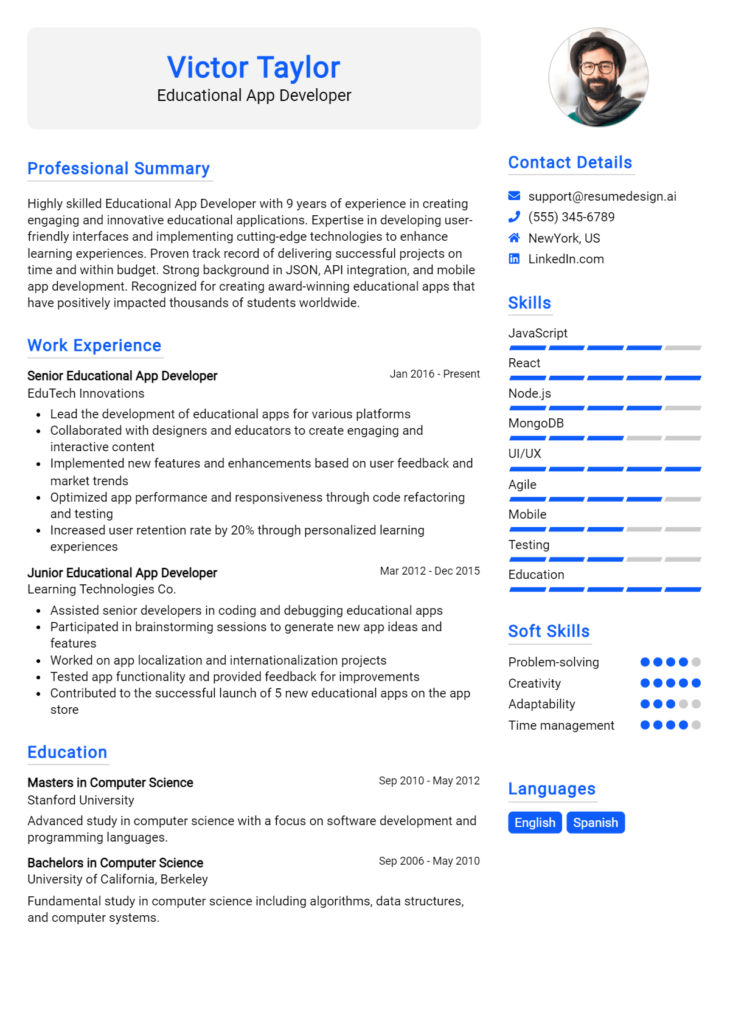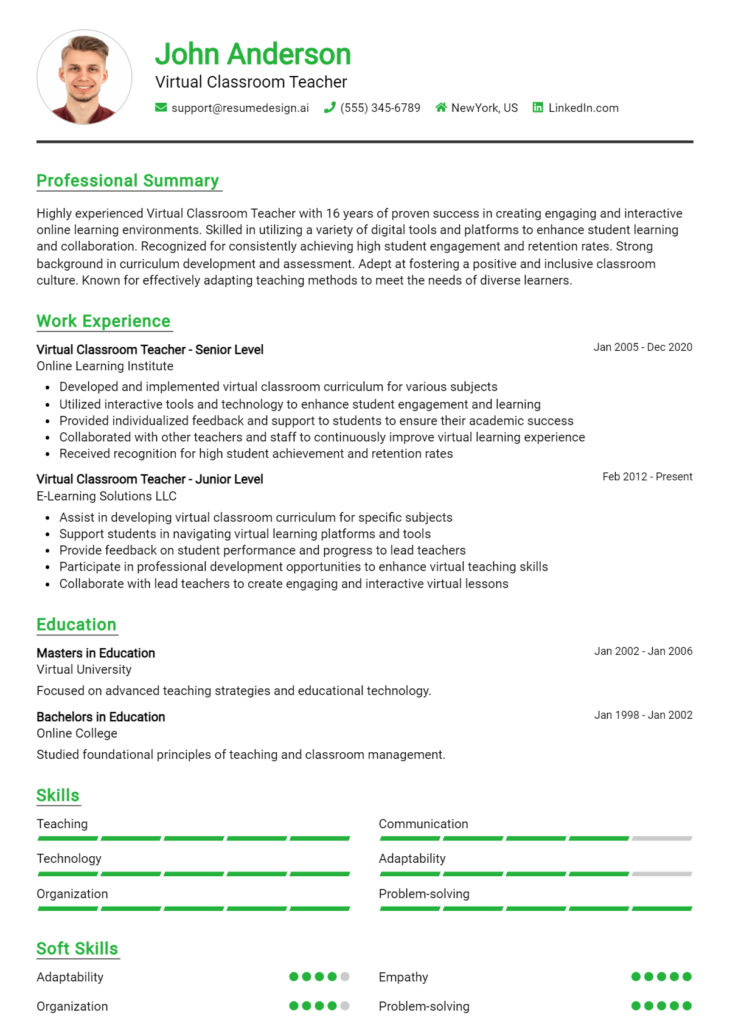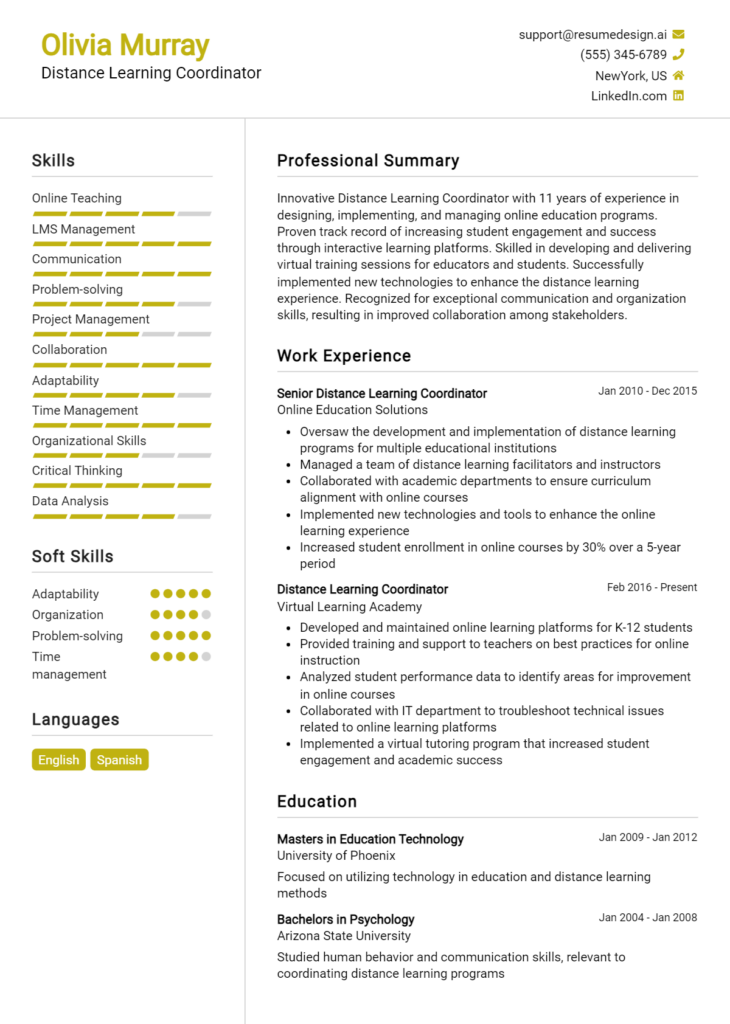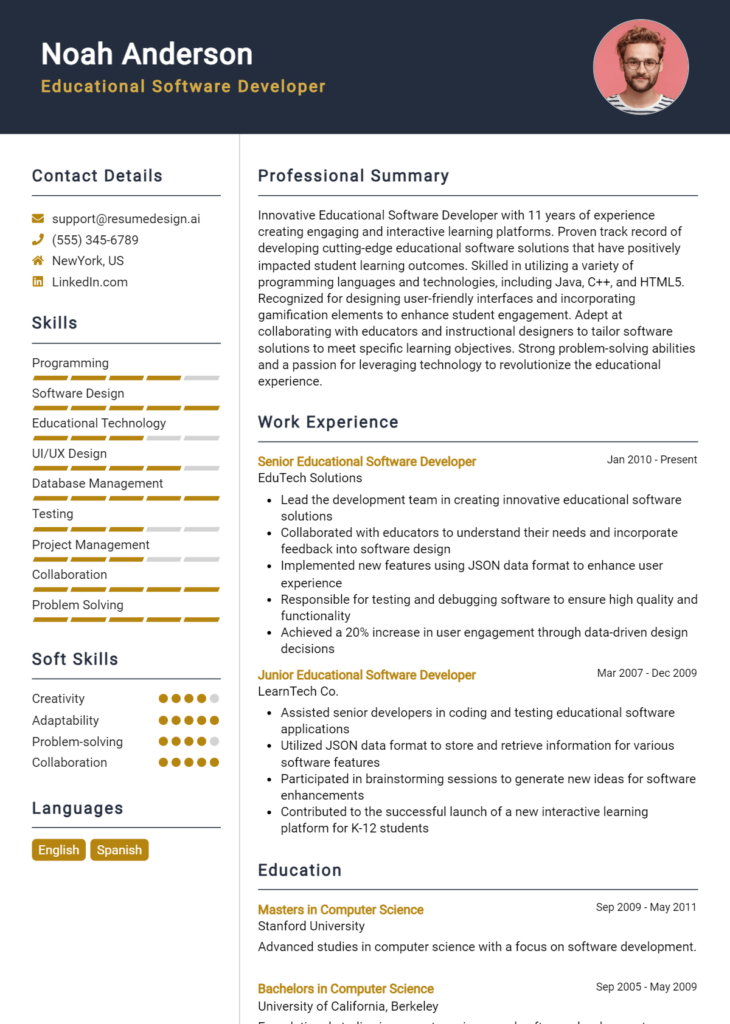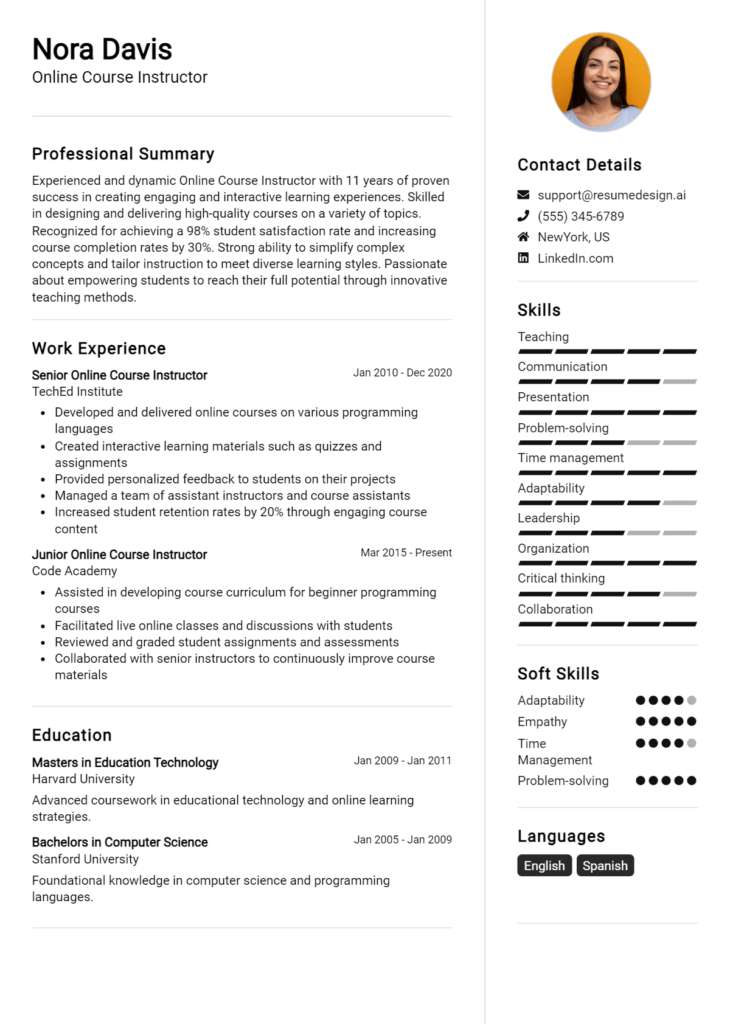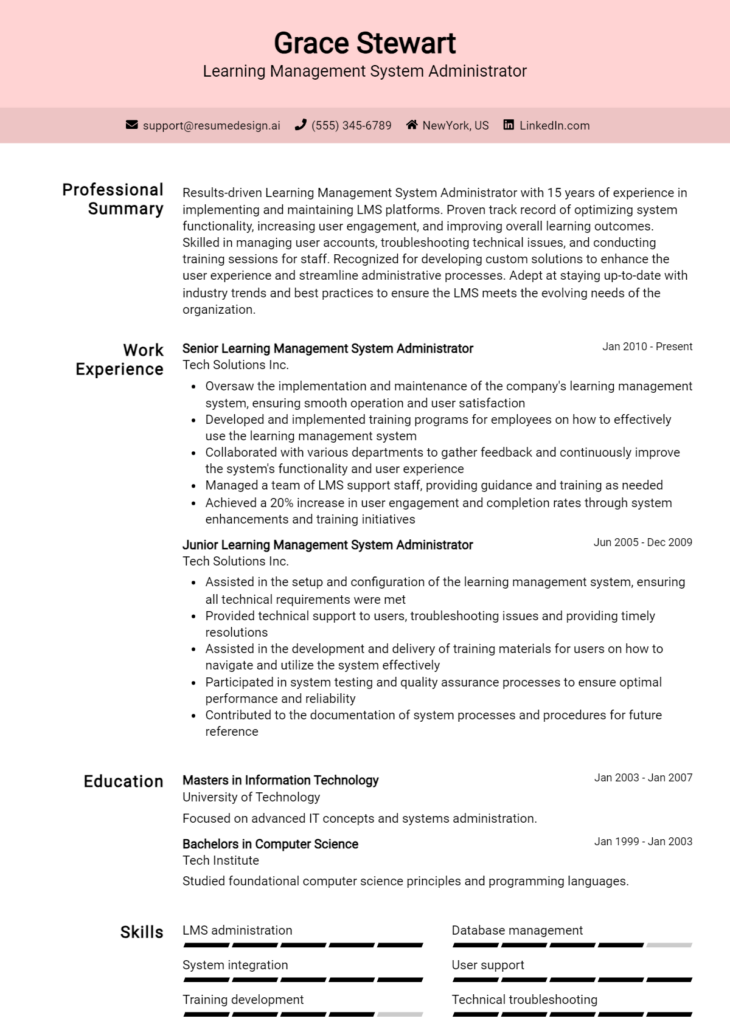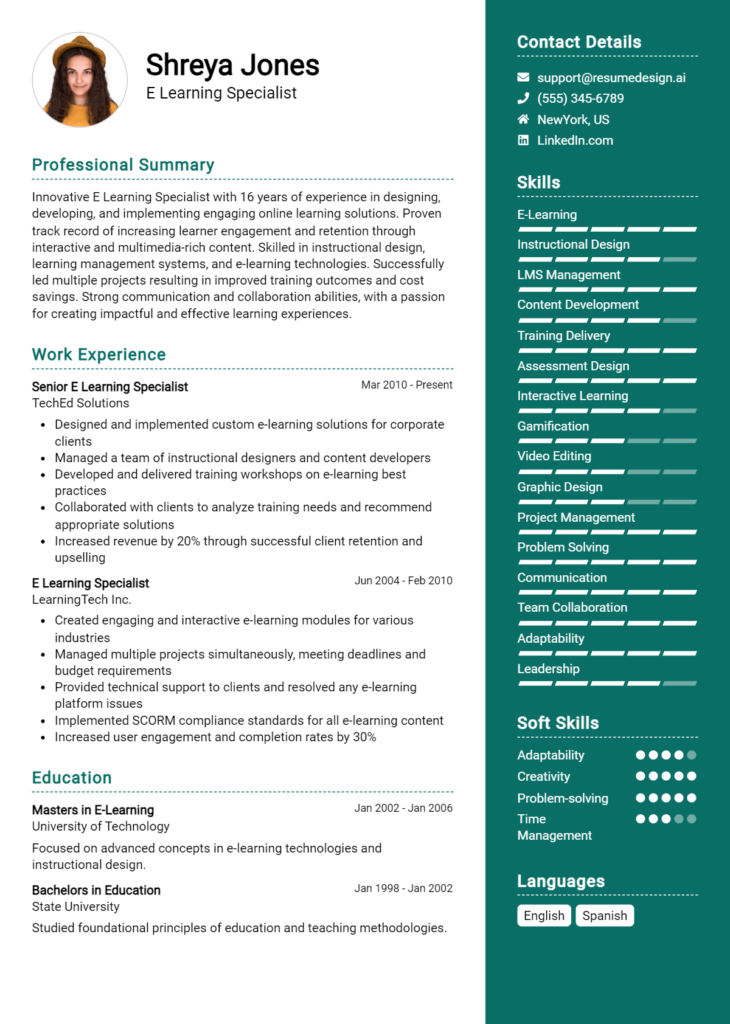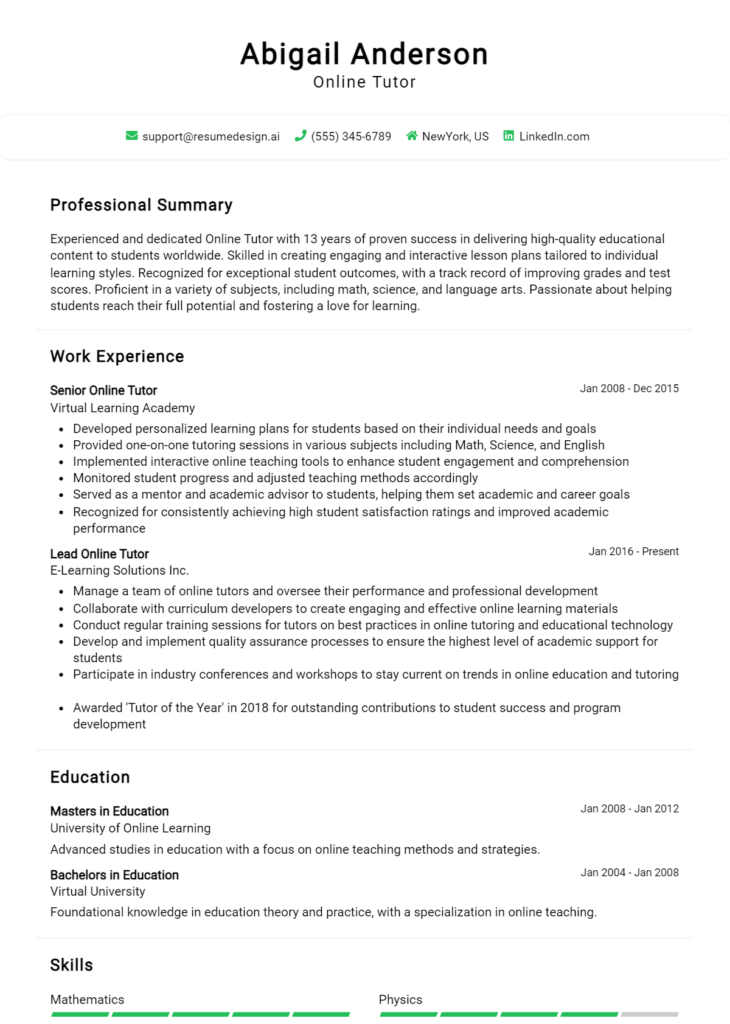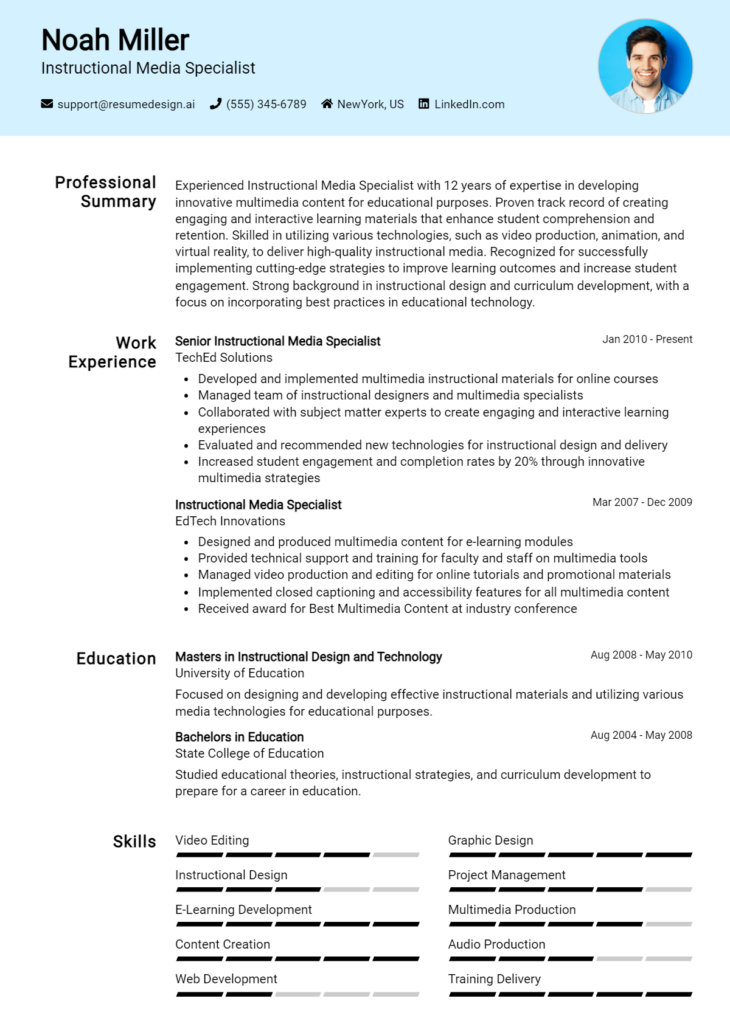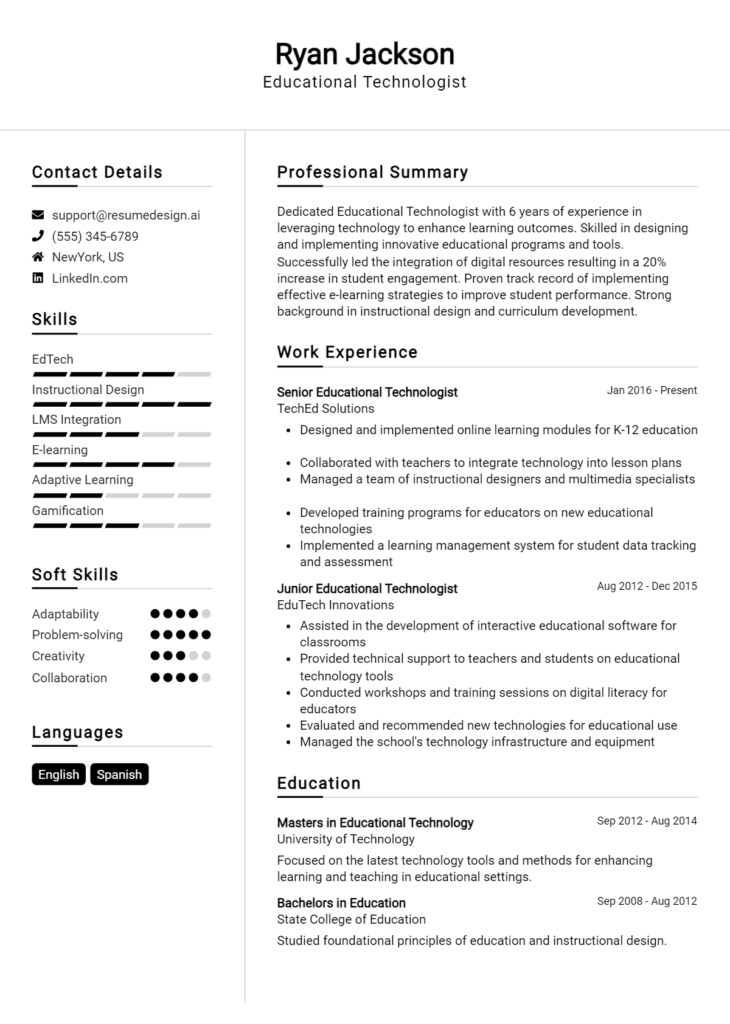Education Technology Specialist Core Responsibilities
An Education Technology Specialist plays a vital role in enhancing learning experiences by integrating technology across various departments. Key responsibilities include evaluating educational tools, providing training for faculty, and ensuring the seamless implementation of tech solutions. Essential skills encompass technical expertise, operational management, and advanced problem-solving abilities, all contributing to the organization’s educational goals. A well-crafted resume highlighting these capabilities is crucial for demonstrating the specialist's impact on student engagement and institutional success.
Common Responsibilities Listed on Education Technology Specialist Resume
- Assessing and recommending educational technology tools and resources.
- Collaborating with faculty to design tech-enhanced curricula.
- Providing training and support for educators on new technologies.
- Monitoring and evaluating the effectiveness of technology integration.
- Facilitating workshops and professional development sessions.
- Managing technology-related projects and initiatives.
- Conducting research on emerging educational technologies.
- Developing and maintaining documentation for tech tools and processes.
- Acting as a liaison between IT and academic departments.
- Troubleshooting technical issues and providing solutions.
- Engaging in continuous learning to stay updated on industry trends.
High-Level Resume Tips for Education Technology Specialist Professionals
In the competitive landscape of education technology, a well-crafted resume serves as your ticket to making a strong first impression on potential employers. For Education Technology Specialist professionals, this document is not just a list of qualifications; it's a narrative that showcases your unique blend of skills, experiences, and achievements in the field. A resume that effectively reflects your expertise can set you apart from other candidates and significantly increase your chances of landing that coveted interview. This guide will provide practical and actionable resume tips tailored specifically for Education Technology Specialist professionals, ensuring your application stands out in a crowded job market.
Top Resume Tips for Education Technology Specialist Professionals
- Tailor your resume to each job description by using keywords and phrases from the posting.
- Highlight relevant experience in education technology, including roles in curriculum development, instructional design, or technology integration.
- Quantify your achievements with specific metrics, such as the percentage of improved student engagement or increased efficiency in technology use.
- Incorporate industry-specific skills, including familiarity with learning management systems (LMS), educational software, and data analysis tools.
- Showcase certifications and training in education technology or related fields to bolster your qualifications.
- Use a clean and professional format that enhances readability and focuses on key information.
- Include a summary statement at the top that encapsulates your career goals and expertise in education technology.
- Emphasize collaboration skills, showcasing how you've successfully worked with educators, administrators, and IT professionals.
- Keep your resume concise, ideally one page, while still providing enough detail to demonstrate your qualifications.
By implementing these tips, you can significantly enhance your resume's effectiveness and increase your chances of securing a position in the Education Technology Specialist field. A well-optimized resume not only highlights your qualifications but also demonstrates your commitment to the evolving landscape of educational technology, making you a more attractive candidate to potential employers.
Why Resume Headlines & Titles are Important for Education Technology Specialist
In the competitive field of education technology, a well-crafted resume headline or title serves as a vital first impression for hiring managers. The headline acts as a concise summary of a candidate's key qualifications, encapsulating their expertise and relevance to the role of an Education Technology Specialist. A strong headline can capture attention immediately, prompting employers to delve deeper into the resume. It should be succinct, directly aligned with the job description, and tailored to reflect the unique skills and experiences that set the candidate apart from the rest.
Best Practices for Crafting Resume Headlines for Education Technology Specialist
- Keep it concise: Aim for one impactful phrase that conveys your expertise.
- Be role-specific: Tailor your headline to reflect the specific position you are applying for.
- Highlight key skills: Incorporate relevant skills that align with the job description.
- Use action-oriented language: Employ dynamic verbs to convey your contributions and achievements.
- Avoid jargon: Use clear and accessible language to ensure your headline resonates with a broad audience.
- Reflect your experience level: Indicate your level of expertise, whether you are an entry-level candidate or a seasoned professional.
- Make it unique: Differentiate yourself by highlighting what makes you a standout candidate.
- Incorporate industry keywords: Use keywords relevant to the education technology field to improve visibility in applicant tracking systems.
Example Resume Headlines for Education Technology Specialist
Strong Resume Headlines
Innovative Education Technology Specialist with 5+ Years in E-Learning Development
Data-Driven Education Technology Expert Enhancing Student Engagement through Interactive Learning Solutions
Certified Education Technology Specialist Focused on Seamless Integration of Digital Tools in K-12 Settings
Weak Resume Headlines
Education Professional Looking for a Job
Experience in Technology and Education
Strong headlines are effective because they clearly communicate the candidate's unique strengths and specific qualifications, making it easy for hiring managers to quickly assess their fit for the role. They are tailored and impactful, showcasing the individual’s expertise while aligning perfectly with the job requirements. In contrast, weak headlines fail to impress because they are vague, generic, and lack focus, leaving hiring managers with little motivation to explore the resume further. A compelling headline can be the difference between landing an interview or getting lost in the shuffle of applicants.
Writing an Exceptional Education Technology Specialist Resume Summary
Writing a compelling resume summary is crucial for an Education Technology Specialist, as it serves as the first impression a hiring manager receives. A strong summary quickly captures attention by succinctly showcasing key skills, relevant experience, and significant accomplishments tailored to the specific job at hand. This brief yet impactful introduction can differentiate candidates in a competitive job market, making it essential to craft a summary that not only highlights qualifications but also aligns with the employer's needs.
Best Practices for Writing a Education Technology Specialist Resume Summary
- Quantify Achievements: Use numbers to illustrate your successes, such as improved test scores or increased technology integration rates.
- Focus on Skills: Highlight key skills relevant to educational technology, such as instructional design, data analysis, or software proficiency.
- Tailor the Summary: Customize your summary for each job application by incorporating keywords and phrases from the job description.
- Be Concise: Keep your summary brief, ideally within 3-5 sentences, to maintain the reader's attention.
- Showcase Relevant Experience: Emphasize experience that directly relates to the role, including specific projects or initiatives you've led.
- Highlight Continuous Learning: Mention any certifications or training that reflect a commitment to staying updated in the field.
- Demonstrate Impact: Use action verbs and impactful language to convey your contributions and their significance in previous roles.
Example Education Technology Specialist Resume Summaries
Strong Resume Summaries
Dynamic Education Technology Specialist with over 7 years of experience in implementing innovative learning solutions, resulting in a 30% increase in student engagement and a 25% improvement in academic performance across diverse educational settings.
Dedicated professional with a proven track record of developing and deploying technology-based curricula, enhancing learning outcomes for over 1,000 students and achieving a 95% satisfaction rate among educators through tailored training programs.
Results-oriented Education Technology Specialist skilled in data analysis and instructional design, having successfully led a district-wide initiative that integrated digital tools into classrooms, resulting in a 40% increase in usage of educational software among teachers.
Weak Resume Summaries
Experienced education professional with a background in technology. I am looking for a new opportunity in this field.
Passionate about using technology in education and have worked in various roles. I hope to contribute to a team.
The strong resume summaries are considered effective because they clearly articulate specific achievements and relevant skills while showcasing measurable results. They provide tangible evidence of the candidate's impact in previous roles, making them stand out to hiring managers. In contrast, the weak summaries lack specificity and quantifiable outcomes, making them appear generic and unconvincing to potential employers.
Education and Certifications Section for Education Technology Specialist Resume
The Education and Certifications section of an Education Technology Specialist resume is crucial as it serves to highlight the candidate's academic background, relevant industry certifications, and commitment to continuous learning. This section not only showcases formal education but also emphasizes specialized training and coursework that aligns with the demands of the role. By including pertinent certifications and educational experiences, candidates can significantly enhance their credibility and demonstrate their preparedness to leverage technology in educational environments effectively.
Best Practices for Education Technology Specialist Education and Certifications
- Prioritize relevant degrees, such as a Master's in Educational Technology or Instructional Design.
- Include industry-recognized certifications, such as Google Certified Educator or ISTE Certification for Educators.
- List specific coursework that relates directly to technology integration in education.
- Highlight any specialized training in software or platforms commonly used in education, like Learning Management Systems (LMS).
- Ensure certifications are current and relevant to the latest educational technology trends.
- Consider including professional development workshops or conferences attended.
- Use clear and concise language to describe your educational achievements and certifications.
- Organize this section in reverse chronological order, starting with the most recent qualifications.
Example Education and Certifications for Education Technology Specialist
Strong Examples
- M.Ed. in Educational Technology, University of XYZ, 2021
- Google Certified Educator Level 2, 2022
- Certificate in Instructional Design for eLearning, ABC Institute, 2020
- Coursework: Digital Learning Strategies, Data-Driven Decision Making in Education
Weak Examples
- Bachelor of Arts in History, University of ABC, 2010
- Certification in Microsoft Office Suite, 2015
- High School Diploma, XYZ High School, 2008
- Online Course: Basic HTML, 2016
The strong examples provided are considered robust as they align directly with the qualifications sought in an Education Technology Specialist, showcasing advanced degrees and relevant certifications that emphasize expertise in the field. Conversely, the weak examples lack relevance to the role, featuring outdated or unrelated educational qualifications that do not support the candidate’s ability to thrive in a technology-driven educational environment.
Top Skills & Keywords for Education Technology Specialist Resume
In the ever-evolving field of education technology, the right skills are crucial for an Education Technology Specialist to effectively support educators and learners alike. A well-crafted resume that highlights both soft and hard skills can set candidates apart in a competitive job market. Soft skills, such as communication and adaptability, enable specialists to collaborate with diverse teams and respond to the dynamic needs of educational environments. On the other hand, hard skills, like proficiency in various educational software and data analysis, ensure that specialists can implement and manage technology solutions effectively. By showcasing a balanced combination of these skills, candidates can demonstrate their expertise and readiness to drive technology integration in educational settings.
Top Hard & Soft Skills for Education Technology Specialist
Soft Skills
- Communication
- Collaboration
- Problem-solving
- Adaptability
- Critical thinking
- Creativity
- Time management
- Empathy
- Leadership
- Conflict resolution
Hard Skills
- Learning Management Systems (LMS) proficiency
- Data analysis and interpretation
- Educational software development
- Instructional design
- Technical support and troubleshooting
- Curriculum integration
- E-learning tools (e.g., Articulate, Captivate)
- Project management
- Knowledge of coding and programming languages
- Familiarity with accessibility standards in education
For more insights on how to effectively present your skills and work experience, consider exploring additional resources that can enhance your resume.
Stand Out with a Winning Education Technology Specialist Cover Letter
Dear [Hiring Manager's Name],
I am writing to express my interest in the Education Technology Specialist position at [Company/Institution Name]. With a solid background in educational technology and a passion for enhancing the learning experience through innovative solutions, I am excited about the opportunity to contribute to your team's mission to improve educational outcomes. My experience in integrating technology into classroom environments and my commitment to fostering a supportive learning atmosphere align perfectly with the goals of your organization.
In my previous role at [Previous Institution/Company Name], I successfully implemented a variety of technology initiatives that enhanced student engagement and facilitated personalized learning. I collaborated with educators to design and deliver professional development workshops focused on effective technology integration. My ability to assess the needs of both teachers and students allowed me to tailor solutions that not only improved instructional practices but also empowered learners to take ownership of their education. I am adept at utilizing data analytics to evaluate the effectiveness of technology programs and making data-driven decisions to optimize learning experiences.
I am particularly impressed by [Company/Institution Name]'s commitment to innovation and continuous improvement in education. I am eager to bring my expertise in e-learning platforms, digital content creation, and curriculum development to your team. My strong communication skills and ability to foster relationships with stakeholders will allow me to effectively collaborate with educators, administrators, and technology teams to drive successful implementations of educational technologies. I am enthusiastic about the possibility of contributing to [Company/Institution Name]'s mission and supporting educators and students in achieving their goals.
Thank you for considering my application. I look forward to the opportunity to discuss how my background, skills, and enthusiasms align with the needs of your team. I am excited about the potential to make a positive impact on the educational landscape at [Company/Institution Name].
Sincerely,
[Your Name]
Common Mistakes to Avoid in a Education Technology Specialist Resume
When crafting a resume for the position of an Education Technology Specialist, it's essential to present your qualifications and experiences effectively. However, many candidates make common mistakes that can detract from their overall presentation. Avoiding these pitfalls will enhance your chances of standing out in a competitive job market. Here are some common mistakes to steer clear of:
Generic Objective Statement: Using a vague objective that doesn’t specify your goals or how you can contribute to the organization can make your resume blend in rather than shine. Tailor your objective to align with the specific role you’re applying for.
Overloading with Jargon: While technical terminology is important in education technology, overusing jargon can confuse hiring managers who may not be as familiar with specific terms or acronyms. Use clear language and explain complex concepts succinctly.
Lack of Quantifiable Achievements: Focusing solely on responsibilities rather than achievements can weaken your resume. Include quantifiable results (e.g., “Implemented a new learning management system that increased student engagement by 30%”) to demonstrate your impact.
Ignoring Format and Structure: An unorganized or cluttered resume can make it difficult for employers to read and find key information. Use consistent formatting, clear headings, and bullet points to enhance readability.
Neglecting Soft Skills: While technical skills are crucial, education technology specialists also need strong communication, collaboration, and problem-solving abilities. Highlight these soft skills alongside your technical expertise to present a well-rounded profile.
Failing to Customize for Each Application: Sending out the same resume for multiple job applications can be detrimental. Tailor your resume for each position by emphasizing relevant skills and experiences that match the job description.
Not Including Professional Development: Education technology is a rapidly evolving field. Failing to mention ongoing professional development, such as certifications, workshops, or relevant courses, can make you seem less committed to staying current in the industry.
Forgetting Contact Information: It may seem basic, but omitting or misplacing contact details can hinder employers from reaching you. Ensure your contact information is prominently placed and up to date.
Conclusion
As we explored the vital role of an Education Technology Specialist, it is evident that this position not only requires a strong foundation in educational principles but also a deep understanding of various technologies that enhance learning experiences. Key responsibilities include integrating technology into curricula, training educators on tech tools, and evaluating the effectiveness of tech implementations in educational settings.
To stand out in this competitive field, it's crucial to have a polished and relevant resume that highlights your expertise, experience, and accomplishments. Take the time to review your Education Technology Specialist resume to ensure it accurately reflects your skills and aligns with current industry standards.
Utilize the available resources to enhance your job application materials. Consider using resume templates to create a professional layout, or take advantage of the resume builder for an easy and efficient way to construct your resume. Additionally, explore resume examples to gain inspiration and see what works well in the industry. Don’t forget to craft a compelling cover letter with the help of cover letter templates that can complement your resume and make a strong impression on potential employers.
Take action today: review your resume, leverage these tools, and prepare to showcase your qualifications as an exceptional Education Technology Specialist!

